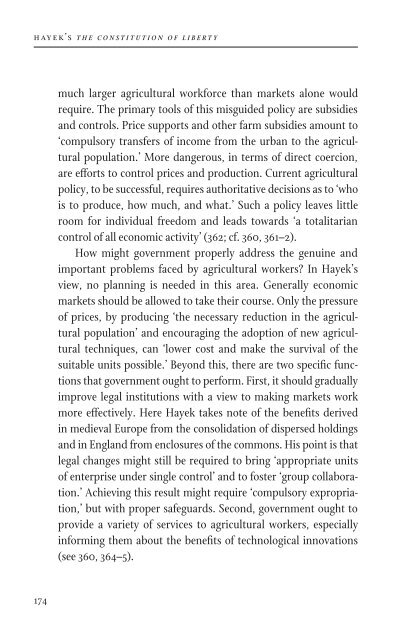Hayek's The Constitution of Liberty - Institute of Economic Affairs
Hayek's The Constitution of Liberty - Institute of Economic Affairs
Hayek's The Constitution of Liberty - Institute of Economic Affairs
You also want an ePaper? Increase the reach of your titles
YUMPU automatically turns print PDFs into web optimized ePapers that Google loves.
h ay e k ’ s t h e c o n s t i t u t i o n o f l i b e r t y<br />
s a f e g ua r d i n g p r o g r e s s<br />
much larger agricultural workforce than markets alone would<br />
require. <strong>The</strong> primary tools <strong>of</strong> this misguided policy are subsidies<br />
and controls. Price supports and other farm subsidies amount to<br />
‘compulsory transfers <strong>of</strong> income from the urban to the agricultural<br />
population.’ More dangerous, in terms <strong>of</strong> direct coercion,<br />
are efforts to control prices and production. Current agricultural<br />
policy, to be successful, requires authoritative decisions as to ‘who<br />
is to produce, how much, and what.’ Such a policy leaves little<br />
room for individual freedom and leads towards ‘a totalitarian<br />
control <strong>of</strong> all economic activity’ (362; cf. 360, 361–2).<br />
How might government properly address the genuine and<br />
important problems faced by agricultural workers? In Hayek’s<br />
view, no planning is needed in this area. Generally economic<br />
markets should be allowed to take their course. Only the pressure<br />
<strong>of</strong> prices, by producing ‘the necessary reduction in the agricultural<br />
population’ and encouraging the adoption <strong>of</strong> new agricultural<br />
techniques, can ‘lower cost and make the survival <strong>of</strong> the<br />
suitable units possible.’ Beyond this, there are two specific functions<br />
that government ought to perform. First, it should gradually<br />
improve legal institutions with a view to making markets work<br />
more effectively. Here Hayek takes note <strong>of</strong> the benefits derived<br />
in medieval Europe from the consolidation <strong>of</strong> dispersed holdings<br />
and in England from enclosures <strong>of</strong> the commons. His point is that<br />
legal changes might still be required to bring ‘appropriate units<br />
<strong>of</strong> enterprise under single control’ and to foster ‘group collaboration.’<br />
Achieving this result might require ‘compulsory expropriation,’<br />
but with proper safeguards. Second, government ought to<br />
provide a variety <strong>of</strong> services to agricultural workers, especially<br />
informing them about the benefits <strong>of</strong> technological innovations<br />
(see 360, 364–5).<br />
Natural resource policy<br />
<strong>The</strong> latter half <strong>of</strong> Chapter 23 addresses indirectly this enduring<br />
question: how is humankind to regard ‘a free gift <strong>of</strong> nature’?<br />
With some exceptions, Hayek views nature’s gifts as an available<br />
supply or ‘resource’ to be used in fostering economic progress.<br />
Much government policy, by contrast, is premised on the idea<br />
that natural resources have a special standing, such that they must<br />
be preserved and protected from exploitation by private enterprise,<br />
even with far-reaching controls that greatly limit individual<br />
freedom. Hayek replies that a natural resource should be treated<br />
the same way as other resources, such as ‘man-made equipment<br />
or human capacities,’ that might be invested in productive activity<br />
(367, 373–4).<br />
Hayek points out that some natural resources are diminished<br />
by use and are eventually used up, while others can be so managed<br />
as to yield a durable stream <strong>of</strong> benefits. In either case, however, he<br />
has no objection to exhausting a natural resource, if that appears<br />
to be the best strategy to maximise income. <strong>The</strong> market <strong>of</strong>fers<br />
better foresight in these matters than government planning; and<br />
one lesson <strong>of</strong> advancing technology has been that new and unanticipated<br />
resources will emerge to replace existing ones (368–70,<br />
374).<br />
Most <strong>of</strong> the arguments for ‘government control <strong>of</strong> private<br />
activity in the interest <strong>of</strong> conservation <strong>of</strong> natural resources’ are, in<br />
Hayek’s view, invalid. He recognises an exception, however, where<br />
the aim is not income maximisation, but providing recreational<br />
opportunities and preserving natural beauty or sites <strong>of</strong> historical<br />
or scientific interest. Such amenities render a service to the public<br />
at large, providing advantages for which the individual beneficiary<br />
cannot be charged a price. Also, they usually require large tracts<br />
174<br />
175












